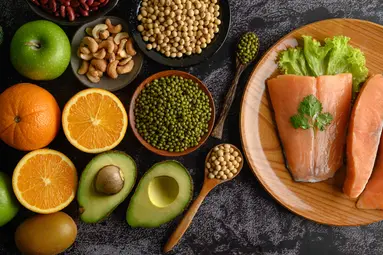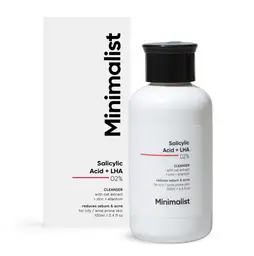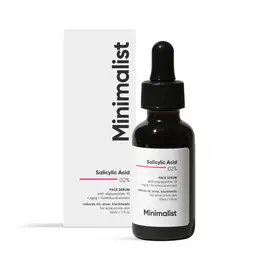A Comprehensive Guide To Prevent Acne

A Comprehensive Guide To Prevent Acne
Posted on 24th Oct, 2024
Struggling with acne, whether as a teen, adult or someone simply trying to maintain healthy skin? You're not alone, studies show that the frequency of adult acne ranges up to 90% in today’s world.
While acne may seem unavoidable, it can be effectively managed with a consistent skincare routine. This guide provides simple, zero-cost treatment for face acne.
Daily Skincare Routine for Preventing Acne
Following a structured daily skincare routine to specific times of the day can help keep acne under control.
Phase 1: Morning Skincare Routine (Hours 1–4)
- Cleanse Your Skin Gently (2 Minutes)
Use a gentle cleanser for 2 minutes to remove dirt and excess oil without stripping your skin's moisture barrier.
- Delay Caffeine, Hydrate First (Drink 500ml of Water)
Avoid drinking caffeinated beverages for 90 - 120 minutes after waking up. Instead, start your day by drinking 500 ml water within the first 30 minutes to support skin hydration.
- Get 10-15 Minutes of Morning Sunlight (Between 7–9 AM)
Exposure to sunlight between 7–9 AM helps regulate your circadian rhythm, it supports healthy skin repair and regeneration during the night.
Phase 2: Midday Routine (Hours 5–13)
- Consistent Rehydration
Drink 2–3 liters of water throughout the day. Staying hydrated helps flush out toxins that may lead to acne.
- Consume Healthy, Low-Glycemic Lunch/Dinner
Eat a balanced, low-glycemic diet (rich in vegetables, lean proteins, and healthy fats) to prevent blood sugar spikes that can trigger breakouts.
Example: Jowar/ Bajra Roti with Chana/ Rajma/ Moong Dal.
Leafy greens (spinach, lettuce) vegetables
Any quinoa or brown rice recipe
Seasonal fruits like apples, oranges, or berries.
- Take a 10-15 Minute Walk After Lunch/Dinner
Light movement after meals can help regulate blood sugar levels and increase blood flow to the skin which supports healing and reduces acne inflammation.
Phase 3: Evening Skincare Routine (Hours 14–24)
- Double Cleanse (If You Wore Makeup)
If you wear makeup or sunscreen, start by using an oil-based cleanser for 60 seconds, followed by a water-based cleanser to remove dirt and impurities without clogging pores.
- Use a Targeted Treatment
Use a non-pore-clogging moisturizer to keep your skin hydrated without clogging pores. You can choose gel moisturizers or the ones with hyaluronic acid to keep the skin hydrated.
- Optimize Sleep
Aim for 7–9 hours of sleep to allow your skin time to repair and rejuvenate overnight. Keep your room dark and at a cool temperature to promote deep sleep.
What causes Acne?
Acne happens when the pores of your skin become clogged with excess oil, dead skin cells, or bacteria. While it’s most common among teens, adults can struggle with it too, especially women. There can be various factors causing acne, including:
- Hormones: Hormonal changes, especially during puberty, pregnancy, or menopause, cause oil glands to overproduce, leading to clogged pores and breakouts.
- Family History: If anyone in your home had acne, there’s a chance you might develop it too.
- Medications: Certain medications like corticosteroids or lithium can trigger acne.
- Diet: Studies suggest that eating too many carbs (bread, chips, and sugary foods) makes acne worse.
- Stress: Stress doesn’t directly cause acne, but may aggravate the existing acne condition.
Takeaway for Acne-Prone Skin
Preventing acne doesn’t have to be an overly complicated routine. You can follow a structured skincare plan paired with essential nutrients and tackle both issues from the outside and within. Here are some key tips:
Take Essential Supplements: To effectively support your skin, consider incorporating specific supplements into your routine. For instance, Zinc, Vitamin E, Vitamin D, and Omega-3s prevent bacteria buildup, enhance skin healing, and reduce inflammation.
Stay Hydrated: Drink at least 8 glasses of water a day to keep your skin hydrated and prevent acne flare-ups due to dehydration.
Limit High Glycemic Foods: Reduce refined carbs and sugary foods or processed food items that can spike insulin levels and trigger breakouts.
Remember, no skincare routine can get you overnight results, it takes time for about 4 to 8 weeks to see the changes in your skin.
Get in touch with our healthcare experts for more detailed information here.

Health articles from our experts

Guide To Eating for Anti-Aging Benefits and Youthful Skin
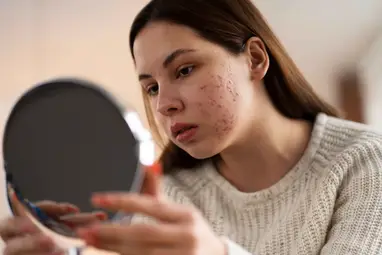
Guide To Eating for Acne-Free Skin

Revitalize your Dull Skin with Amla and ABC Juice
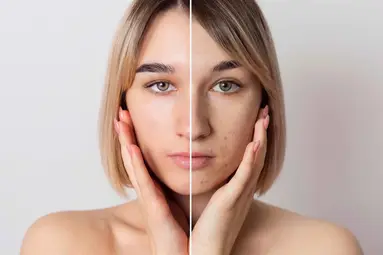
A Comprehensive Guide On How To Reduce Pigmentation
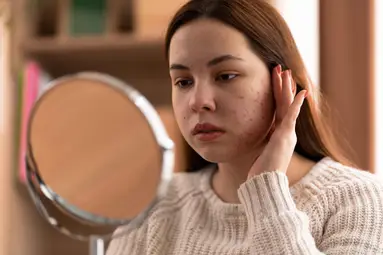
A Comprehensive Guide To Prevent Acne
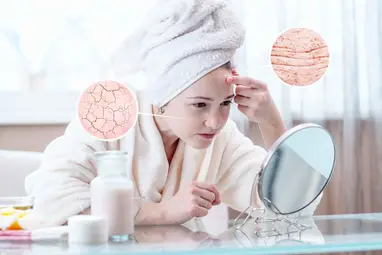
Skincare Tips for Different Seasons - Adapting Your Routine to Weather Changes

CoQ10 for Skin: Benefits & Ways to Use It

5 Best Benefits Of Ashwagandha For Skin

10 Foods Rich In Glutathione
